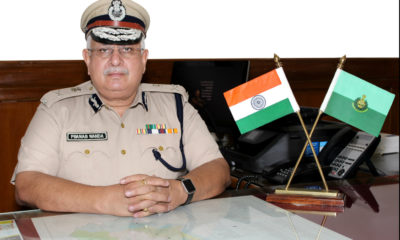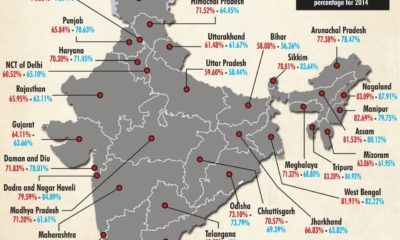World
T&T general elections on September 7

Port of Spain: General elections will be held September 7 in the Caribbean nation of Trinidad and Tobago, home to a huge ethnic Indian population, Prime Minister Kamla Persad-Bissessar has said.
Persad-Bissessar, who is of Indian origin, made the announcement at the final sitting of the 41-member House of Representatives on Friday.
On May 24, 2010, Persad-Bissessar became the first Hindu woman to sit on the prime minister’s chair of this Caribbean nation.
During Friday’s announcement, she said that she would advise the president to dissolve parliament at midnight on Wednesday, June 17.
Persad-Bissessar formed the People’s Partnership coalition government with her United National Congress(UNC), the Congress of the People(COP), the Movement for Social Justice(MSJ, the National Joint Action Committee(NJAC) and the Tobago Organisation of People(TOP).
Several social issues, infrastructural matters and political matters are projected to be aired on the political platforms during the 87-day campaign for the September 7 elections, the 10th in the country.
For several weeks now, the opposition People’s National Movement (PNM), led by Keith Rowley, has been campaigning prior to Friday’s announcement by the prime minister.
This is the first time that a large number of opinion polls have been done with television and radio stations also caught in the process.
The latest opinion poll shows the People’s Partnership coalition getting 21 seats and the PNM 20 seats or vice versa.
Elections in this twin-island republic are based on the ethnic composition of the one million plus voters. All persons 18 years and over are eligible to vote.
This country has a population of 44 percent of East Indian extraction whose forefathers were sourced from India between 1845 and 1917 to work on the agricultural plantations of the then British colony of Trinidad and Tobago.
Observers contend that the elections this year will be tough. Trinidad and Tobago, like India, is a member of the Commonwealth.
World
Lockdowns in China Force Urban Communities to Defy Censorship and Vent Frustration Online

Shanghai’s rich middle class is leading a wave of online dissent over the strict and prolonged lockdowns imposed in various parts of the country. Chinese internet censorship is struggling as patience is wearing thin in many urban centers, coming up with creative forms of online protests.
Social Media Posts Revealing Lockdown Tension in Shanghai
Drawn-out lockdowns are nothing new in China as authorities insist with the nation’s zero-Covid policy since the start of the pandemic. Currently over This time around, however, metropolitan areas like Shanghai are increasingly difficult to keep quiet, given that its more than 25 million residents have seen weeks of total isolation along with food shortages and many other service interruptions.
Dozens of towns and reportedly over 300 million Chinese citizens have been affected by lockdowns of different severity. As expected, urban netizens have been most outspoken over their difficulties by finding creative ways to get around state censorship and bans placed on topics, news comments and spontaneous campaigns.
Shanghai residents have been using mobile proxies and hijacking seemingly unrelated hashtags to talk about healthcare issues, delivery failures and the overall severity of their situation. The “positive energy” that the Chinese government wants to transmit during the recent prolonged series of lockdowns does not come naturally to those counting food supplies and online censors are working hard to filter words, trending topics and undesired social media sharing.
WeChat groups and message threads are under constant monitoring. Posts questioning the zero-Covid approach have been quickly deleted, including by leading Chinese health experts like Dr. Zhong Nanshan. Video footage is soon censored and protests and investigations are quickly made to disappear.
Where this has not worked, officials have exposed banners with warnings and outright threats like “watch your own mouth or face punishment”, while drones have been patrolling the city skies. Yet, if anything, this has led to further tensions and unspoken confrontation with Shanghai’s educated and affluent middle class.
Creative Online Solutions Harnessing Civic Energy
Announcements by Chinese social media that they would be publishing the IP addresses of users who “spread rumors” have not helped either. Tech industry research has shown that much of Asia’s tech-savvy population has a habit of using mobile proxies and other privacy tools, quickly finding workarounds to browse the internet freely and talk to the world about the hottest topics.
The sheer volume of forbidden posts is already a challenge for the very censorship system, experts explain. Unable to track all trending hashtags, state workers overlook topics that speak about the US, Ukraine or other popular news. Linking human rights elsewhere to their situation, Chinese online dissidents establish their informal channels and “hijack” the conversation to share personal or publicly relevant information about the Covid suppression in their town.
Sarcastic and satirical posts still dominate. Others hope to evade the censors by replacing words from famous poems or the national anthem. One thing is certain – social media, when harnessed with the right creativity, has proven its ability to mount pressure on the government in even some of the most strictly controlled tech environments like China.























